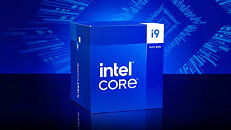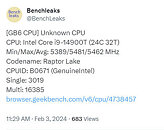T0@st
News Editor
- Joined
- Mar 7, 2023
- Messages
- 2,847 (3.75/day)
- Location
- South East, UK
| System Name | The TPU Typewriter |
|---|---|
| Processor | AMD Ryzen 5 5600 (non-X) |
| Motherboard | GIGABYTE B550M DS3H Micro ATX |
| Cooling | DeepCool AS500 |
| Memory | Kingston Fury Renegade RGB 32 GB (2 x 16 GB) DDR4-3600 CL16 |
| Video Card(s) | PowerColor Radeon RX 7800 XT 16 GB Hellhound OC |
| Storage | Samsung 980 Pro 1 TB M.2-2280 PCIe 4.0 X4 NVME SSD |
| Display(s) | Lenovo Legion Y27q-20 27" QHD IPS monitor |
| Case | GameMax Spark M-ATX (re-badged Jonsbo D30) |
| Audio Device(s) | FiiO K7 Desktop DAC/Amp + Philips Fidelio X3 headphones, or ARTTI T10 Planar IEMs |
| Power Supply | ADATA XPG CORE Reactor 650 W 80+ Gold ATX |
| Mouse | Roccat Kone Pro Air |
| Keyboard | Cooler Master MasterKeys Pro L |
| Software | Windows 10 64-bit Home Edition |
Intel's Core i9-14900T processor was "officially" released last month alongside an expanded population of "Raptor Lake Refresh" products—the T-class alternative to Team Blue's flagship desktop Core i9-14900 CPU is a less glamorous prospect, hence almost zero press coverage and tech reviews. Its apparent lack of visibility is not helped by non-existent availability at retail, despite inclusion in Team Blue's second wave of 14th Generation Core processors (Marketing Status = Launched). The Core i9-14900 (non-K) is readily obtainable around the globe, as a lower-power alternative to the ever greedy Core i9-14900K, but their T-class SKU sibling takes frugality to another level. TPU's resident CPU tester, W1zzard, implemented six distinct power limit settings during a i9-14900K supplemental experiment, with the lowest being 35 W—coincidentally, matching the i9-14900T's default base power.
His simulated findings were not encouraging, to say the least, but late last week BenchLeaks noticed that a lone test system had gauged the T-class part's efficiency-oriented processing prowess. Geekbench 6.2.2 results were generated by an ASRock Z790 PG-ITX/TB4 build (with 64 GB of 5586 MT/s DDR5 SDRAM)—scoring 3019 in the overall single-core category, and 16385 in multi-core stakes. The latter score indicates a 22% performance penalty when referenced against Tom Hardware's Geekbenched i9-14900K sample. The publication reckons that these figures place Intel's Core i9-14900T CPU in good company—notably AMD's Ryzen 9 7900 processor, one of the company's trio of 65 W "non-X" SKUs. Last March, W1zzard was suitably impressed by his review sample's "fantastic energy efficiency"—the Geekbench 6 official scoreboard awards it 2823 (single-core) and 16750 (multi-core) based on aggregated data from multiple submissions.



The Tom's Hardware analysis of the rival chips stated: "Though the Core i9-14900T has an overall performance advantage thanks to its single-core solid score, it would appear to have higher power consumption, uses a platform that won't receive new CPUs, and has an MSRP of $549 compared to the $400 that the Ryzen 9 7900 often goes for." The AMD processor is the better value proposition, and is widely available at retail outlets in the West—the article's conclusion notes that the Core i9-14900T SKU is not listed by any North American merchants.
View at TechPowerUp Main Site | Source
His simulated findings were not encouraging, to say the least, but late last week BenchLeaks noticed that a lone test system had gauged the T-class part's efficiency-oriented processing prowess. Geekbench 6.2.2 results were generated by an ASRock Z790 PG-ITX/TB4 build (with 64 GB of 5586 MT/s DDR5 SDRAM)—scoring 3019 in the overall single-core category, and 16385 in multi-core stakes. The latter score indicates a 22% performance penalty when referenced against Tom Hardware's Geekbenched i9-14900K sample. The publication reckons that these figures place Intel's Core i9-14900T CPU in good company—notably AMD's Ryzen 9 7900 processor, one of the company's trio of 65 W "non-X" SKUs. Last March, W1zzard was suitably impressed by his review sample's "fantastic energy efficiency"—the Geekbench 6 official scoreboard awards it 2823 (single-core) and 16750 (multi-core) based on aggregated data from multiple submissions.



The Tom's Hardware analysis of the rival chips stated: "Though the Core i9-14900T has an overall performance advantage thanks to its single-core solid score, it would appear to have higher power consumption, uses a platform that won't receive new CPUs, and has an MSRP of $549 compared to the $400 that the Ryzen 9 7900 often goes for." The AMD processor is the better value proposition, and is widely available at retail outlets in the West—the article's conclusion notes that the Core i9-14900T SKU is not listed by any North American merchants.
View at TechPowerUp Main Site | Source



